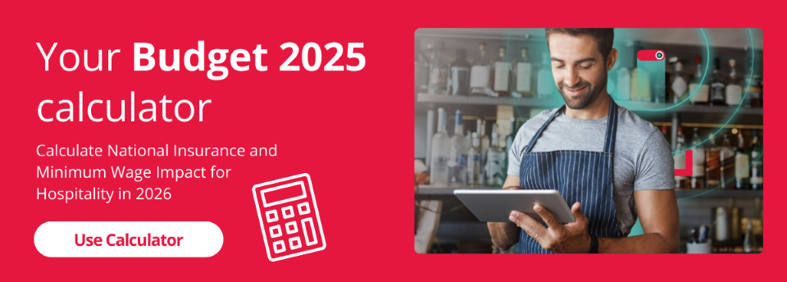
In this article, we explain what the UK Budget means for hospitality now and in the year ahead. We look at the impact of the current cost increases, the upcoming minimum wage rise and permanent business rates cut and share practical steps to help you plan.
You will also find resources like our NI and wage calculator and cost control hub, designed to help you make informed decisions and protect profitability.
“The hospitality industry is a vital part of the UK economy, but today’s Budget was a lost opportunity to spark growth. While reformed business rates relief will help curb insolvencies and job losses, more support is needed to ensure the sector can contribute to national economic renewal.”
Champa Magesh, Managing Director of Access Hospitality
What are the key UK Budget changes for hospitality
The UK Budget introduced several measures that are reshaping the cost structure for hospitality businesses. Here are the main points:
-
Permanent lower business rates tax rates for over 750,000 retail, hospitality and leisure properties, worth nearly £900m a year from April 2026.
-
Employment Allowance increase to £10,500, which took effect earlier this year
-
Minimum wage rise confirmed for April 2026, with rates for workers aged 21+ set between £12.55 and £12.86 per hour.
-
Current transition period includes higher employer NI costs implemented in April 2025 and reduced rates relief starting April 2026.
These changes aim to level the playing field between high street businesses and online competitors. While the long-term outlook is positive, the current trading environment requires careful planning.
Why the current year is challenging for hospitality operators
The transition period is already putting pressure on margins. Rates relief has fallen from 75 percent to 40 percent, capped at £110,000 per business. Combined with employer NI increases, this has created a double cost hit. Restaurants and pubs are seeing bills rise by over 140 percent according to government estimates. For many operators, this means reviewing every aspect of cost control to stay profitable.
How the minimum wage increase will affect hospitality
The Chancellor has confirmed that minimum wage rates will rise from April 2026. For workers aged 21 and over, the National Living Wage is expected to increase to between £12.55 and £12.86 per hour. While this is a win for employees, businesses will need to weigh up how this impacts staffing and trading days. In an industry where many young people work part-time, operators may need to cut staff hours or reduce trading days just to survive.
Margins are already tight, and this increase adds another layer of complexity. Hospitality businesses will need to find ways to absorb these costs without compromising service quality. This could mean investing in smarter scheduling, menu engineering and inventory management to protect profitability. There is also a strong case for more government support to help offset these additional costs.
UKHospitality has warned that wage increases make government support for hospitality essential. The organisation highlights that while higher wages are positive for employees, they add significant cost pressures for operators already facing rising rates and NI contributions. Without additional support, many businesses may be forced to cut staff hours or reduce trading days to survive.
What operators should be doing right now
With cost pressures already biting, operators need to act quickly to protect profitability. Here are practical steps to take today:
-
Review labour scheduling to ensure staffing levels match demand and avoid unnecessary overtime
-
Model wage and NI costs using our NI and wage calculator to understand the impact on your business
-
Optimise menus by focusing on high-margin dishes and reducing waste through accurate recipe costing
-
Control inventory by monitoring purchasing patterns and reducing stock losses
These actions can help you manage the current cost environment and prepare for the upcoming wage increase.
What permanent relief from 2026 means for your business
From April 2026, permanent lower business rates will replace the annual cliff-edge reliefs. This provides certainty and allows operators to plan for the long term. Lower multipliers for hospitality properties will help improve profitability and create a more level playing field with online competitors. Combined with the Employment Allowance increase, this should ease some of the pressure on labour costs.
Tools and resources to manage the transition
We know this is one of the toughest trading periods hospitality has faced in years. Rising costs and tighter margins make every decision feel critical, and operators need clarity and confidence to plan ahead. That is why Access Hospitality provides solutions designed to ease the pressure and give you control.
Our cost control hub offers practical strategies for menu management, labour scheduling and inventory control, helping you find savings without compromising service. When it comes to staffing costs, our NI and wage calculator gives you instant visibility of the impact of wage and NI changes on your business. It is more than a calculator, it is a tool that helps you make informed choices, protect your team and keep your doors open when margins are under strain.
Are you ready for the 2026 wage increases
Hospitality businesses are already feeling the pressure of higher rates and NI costs, and the next big challenge is just around the corner. From April 2026, the National Living Wage is expected to rise to between £12.55 and £12.86 per hour, adding even more strain to margins that are already tight.
In this article, you have seen what the UK Budget means for hospitality, why the current trading environment is so tough, and what permanent relief will look like in 2026. You have also learned practical steps to manage costs now and prepare for the future.
The next step is to take control of your planning. Use our NI and wage calculator to see the real impact of wage and NI changes on your business and explore our cost control hub for strategies that help you stay profitable.

 AU & NZ
AU & NZ
 SG
SG
 MY
MY
 US
US
 IE
IE

